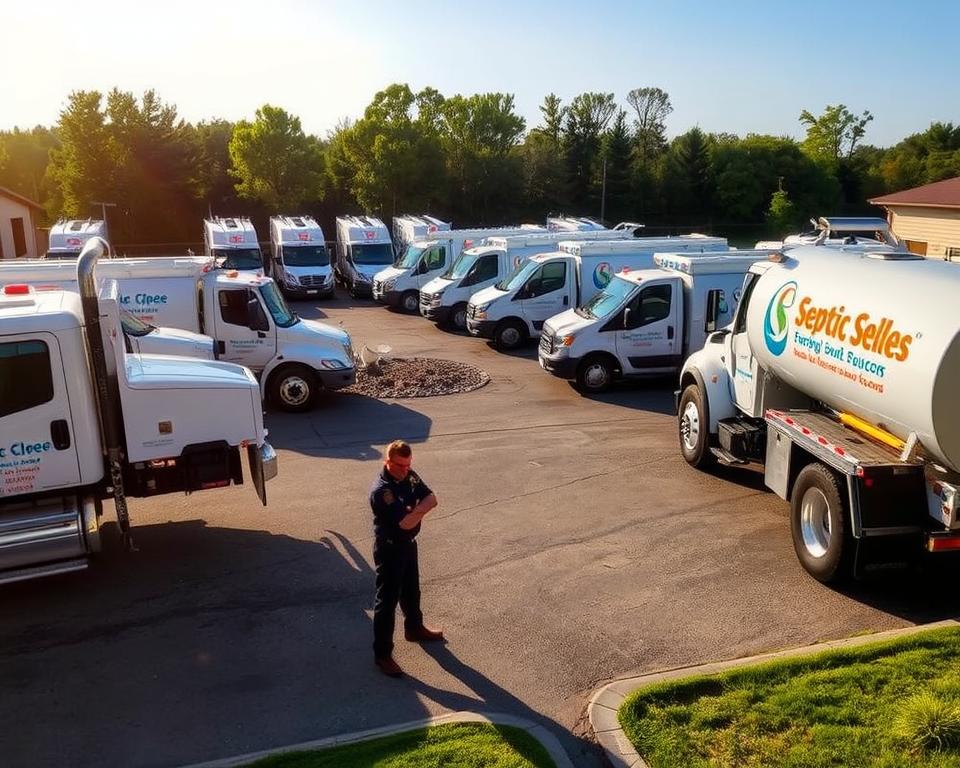What to Do When Moorpark RV Sewer Pumping Service Fails
Essential Care Tips for Your RV Septic Tank Service
Ever wondered what takes place to your RV’s Septic tank while you’re on the road? It’s not just steering clear of nasty odors. Keeping your RV Septic tank in good shape guarantees problem-free journeys. A well-maintained system halts messy mishaps and costly fixes. Yet, many neglect this crucial care. In this guide, we break down the importance for regular black water pumping service. We’ll spotlight maintenance importance and offer tips for cleaning your recreational vehicle’s Septic tank. Prepare for trouble-free journeys!
Key Insights
- Regular RV Septic tank service is critical for peak performance.
- Understanding your RV Septic system helps avoid costly repairs.
- Routine maintenance stops unpleasant odors and clogs.
- Create a pumping schedule suited to your usage.
- Employ best practices for dumping your holding tanks.
- Bypass common mistakes to extend the life of your Septic system.
- Know when to call for professional help for Septic services.
Understanding RV Septic Systems
An RV Septic system is crucial for any camper. It contains multiple holding tanks that handle waste properly. You’ll find three main tanks in an RV: the fresh water, the gray, and the black tank. The fresh water tank provides clean water for drinking and cooking. Meanwhile, the gray tank collects wastewater from sinks and showers, ensuring cleanliness. The black tank, specifically for toilet waste, also has a vent to minimize odors.
Keeping a healthy camper sewage system calls for knowing how these parts connect. Regular checks of the tank levels are vital to avoid overflow and secure everything runs properly. Getting to know the termination valves is crucial too. These valves are pivotal in effectively handling waste disposal. By understanding these components, you can keep your RV in prime form and savor your travels without extra stress.
| Reservoir | Purpose | Capacity |
|---|---|---|
| Fresh Water Tank | Supplies drinking and cooking water | 30-100 gallons |
| Gray Tank | Stores wastewater from sinks and showers | 30-60 gallons |
| Black Tank | Stores toilet waste | 30-50 gallons |
Importance of Regular RV Septic Tank Service
Regular RV Septic tank service is central to keeping your system effective and long-lasting. Without adequate maintenance, you could face system failures, bad smells, and expensive repairs—issues that interrupt your adventures.
Neglecting the upkeep of your RV’s Septic system may cause it to back up. This not only affects your RV’s function but also your comfort levels. A well-maintained and properly cared for system is essential for trouble-free trips, offering you a peaceful travel experience.

Regular maintenance lengthens your sewage system’s lifespan and preserves a clean living space. Keeping an eye on your Septic tank allows you detect issues early. This pre-planning cuts costs and stress, granting you confidence during your journeys.
Frequency of RV Septic Tank Pumping
Figuring out the ideal schedule for RV Septic tank maintenance depends on the vehicle’s usage. For those regularly on the road or staying in their RVs, it’s recommended to drain the black tank every three to five days. This practice keeps cleanliness and prevents unexpected issues during voyages.
Weekend adventurers can generally wait until they return home to pump their Septic tank. Keeping waste in the tank too long, though, can cause build-up that slows the tank’s function and smell control. It’s vital to watch the tank’s level closely, preparing for disposal once it hits around two-thirds full to keep everything running smoothly.
The capacity of your Septic system, along with how you use your RV, will determine when to pump. Knowing these aspects enhances your RV’s performance and cuts the dangers of poor waste management.
| Travel Style | Recommended Pumping Frequency | When to Pump Right Away |
|---|---|---|
| Frequent Usage | Every 3-5 days | Level reads 2/3 |
| Weekend Trips | After return home | Unpleasant odors or lazy draining |
| Extended Trips | Every 2-3 days | Gauge shows near full |
How to Empty RV Holding Tanks Properly
Effectively managing a recreational vehicle’s holding tanks is crucial for a pleasant camping experience. Begin by draining the black tank first. This method lets the gray water to flow through and flush out the hose. Be sure the use of a high-quality sewer hose for a tight connection and to reduce spills. Once the tanks are emptied, completely flushing the black tank is important. Running a built-in black tank flush or comparable alternatives can greatly lessen residue.
After the emptying process, it’s critical to close both valves securely. This action is necessary to maintain a fully operational Septic system. Additionally, RV owners must utilize dump stations properly and comply with local laws. Consistent cleaning practices for recreational vehicle Septic tanks are essential. They maintain the system’s optimal functionality and avoid future odors.
Keeping Your RV Fresh: Odor & Clog Prevention
To control odors and prevent clogs in your RV, attention to detail is key. The task kicks off with verifying enough water in the holding tanks. Adequate water aids in breaking down waste effectively, lowering bad smells.
Choosing suitable toilet paper is important in this process. Opt for RV-safe toilet paper that breaks down quickly, stopping clogs. This minor adjustment significantly helps with maintaining seamless waste flow.
Using enzyme-based treatments can further improve waste decomposition and odor control. These natural solutions assist keep your RV smelling fresh. It’s also crucial to regularly examine vent pipes for obstructions to ensure good airflow and stop odors from infiltrating your living area.
Errors to Dodge in RV Septic Maintenance
Looking after your RV’s Septic system correctly is vital for its effectiveness and longevity. When non-biodegradable items like wipes or feminine products are flushed, they can cause significant blockages. These blockages can result in various problems that are hard to resolve.
Not using enough water when flushing can also damage the system. It causes waste buildup, resulting in foul smells and potential damage. Furthermore, a common mistake at full hook-up sites is leaving the black tank valve open. This causes waste to pool at the tank’s bottom.
Preventive measures involve regularly flushing and rinsing tanks after emptying them. Ignoring maintenance can escalate into significant issues demanding expensive repairs. Being proactive and knowledgeable helps both your RV and your finances.
When to Seek Professional RV Septic Services
Understanding when to seek professional RV Septic services is essential for preserving a healthy Septic system. Some clues point to the need for expert intervention. When you see slow-draining tanks or smell persistent foul odors wafting from your RV, it is prudent to act promptly. These signs often reveal underlying issues that require a thorough Septic tank service for resolution.
Visible leftover waste after emptying can also show problems within your Septic system. This situation may not clear with routine maintenance and may require the use of specialized equipment. Professionals are equipped to address complex challenges with tools, such as high-pressure water jets, to deliver a comprehensive cleaning process.
Early professional assistance can make a major difference. Minor troubles can swiftly grow into more severe complications without proper care. Investing in professional RV Septic services preserves the integrity of your system and lengthens its lifespan.
| Signs of Trouble | What to Do |
|---|---|
| Slow draining tanks | Contact professional RV Septic services for assessment |
| Persistent foul odors | Schedule Septic tank service for diagnostics |
| Visible leftover waste | Seek immediate assistance from a professional |
| Frequent clogs | Consider expert cleaning solutions |
Sustaining RV Septic Performance Over Time
Long-term care for RV Septic systems demands attention beyond basic pump-outs. Carrying out deep cleaning of tanks every few months prevents buildup and extends system life. Examining dump valve seals on schedule stops leaks. Additionally, sanitizing the system keeps it clean and functioning well.
It’s crucial to monitor tank sensors to confirm they work correctly. Incorrect readings may lead to over-filling, affecting performance. Periodic sensor checks and adjusting maintenance schedules can prevent this problem.
| Task | Frequency | Outcome |
|---|---|---|
| Deep Cleaning Tanks | Every 3-6 months | Stops residue accumulation |
| Inspect Dump Valve Seals | Monthly | Reduces risk of leaks |
| Sanitize System | Every 6 months | Controls bacteria |
| Monitor Tank Sensors | Monthly | Prevents over-fill |
Forward-thinking maintenance is central to your RV Septic system’s long-term health. It sets up smooth and seamless travel experiences.
All In Sanitation: Trusted RV Septic Partner
All In Sanitation excels at providing RV Septic services that meet each client’s unique needs. Whether it’s scheduled pump-outs or thorough tank cleaning, they get the essential role of a well-functioning Septic system in your RV’s performance.
Boasting extensive expertise in RV Septic systems, All In Sanitation delivers top-tier guidance on maintenance and care. Their team is knowledgeable in the specific challenges RV owners face and delivers effective solutions when troubles arise.
Opting for All In Sanitation allows RV enthusiasts immerse in their journeys, handing over Septic concerns to a dependable ally. Their dedication to excellent service delivers confidence and enhances the pleasure of adventures on the open road.
To Conclude
Maintaining your RV Septic tank is vital for hassle-free travels. It’s necessary to know your system and stay on top of regular services. This guarantees you won’t face unexpected issues on your journey. These key steps cover frequent pumping and using sound waste management practices.
Efficient long-term care keeps your system in top shape. By using the provided maintenance tips, you can enhance your travel experience. This approach helps avoid expensive repairs later. Bear in mind, avoiding common errors and recognizing when to obtain professional help are vital.
Bottom line, being prepared in your RV Septic system’s maintenance secures a stress-free adventure. It enables you to zero in on forming lasting memories. So, apply these steps to heart and enjoy your road trips to their fullest.

